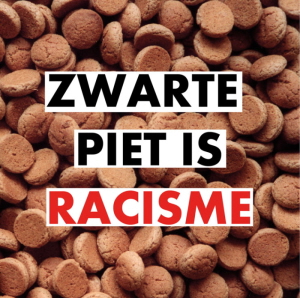The Dutch constitution doesn’t apply. Where’s the rule of law?

In 2016 Doorbraak activist Jennifer van Leijen initiated a campaign to stop the Dutch government from subsidizing blackface (Zwarte Piet or Black Pete) on children’s television. More than 12.000 people already signed. Van Leijen regularly writes updates. Here is number 15 (also read numbers 1, 2, 3, 4, 5, 6/7, 8, 9, 10, 11, 12, 13 and 14).
There’s a saying: absolute power corrupts absolutely. In a healthy democracy, the power of politicians should be limited so that they are prevented from exercising power oppressively. Limiting the power of politicians is mainly achieved by having an institution that has the power to keep the activity of politicians in check. The institution most used for this purpose, in most societies, are the law courts (judiciary). The Dutch state claims that it too has a check on the actions of politicians, and other institutions, namely: the Dutch constitution. The Dutch constitution however contains article 120. Article 120 prohibits the judiciary from reviewing legislature to see if it conforms with the demands of the constitution. This means that judges must apply the law and are not able to critique the law, even when it’s unconstitutional. If a constitution can’t be applied to relevant situations, what use is it? It is a collection of hollow words that give a deceitful impression that fundamental rights are honoured in the Netherlands. Human rights are NOT respected.
Last week, more than a year after anti-blackface racism activists were arrested in Rotterdam, it was made known that the emergency order given by the mayor to stop demonstrators, was invalid. The arrests were therefore not legal. You might assume that there would be further consequences arising from this injustice towards the anti-blackface racism activists, but there are not. These anti-racism activists were robbed of their opportunity to protest, and robbed of their personal freedom for a number of hours, whilst the mayor could take part, undisturbed, in a racist blackface parade! Even though the arrests were illegal, there is no provision in Dutch law for the arrested to claim damages. The Dutch constitution hasn’t prevented this state oppression nor rectified the damage caused by it.
The Dutch national government still subsidises the making of racist children’s television programmes (the series called Het Sinterklaasjournaal). Local government still subsidise racist blackface parades. Mayors still take part in racist blackface parades. Police, under orders from the mayor, still arrest and detain anti-racism protestors.
In juli 2014, a UN delegation, the Working Group of Experts on People of African descent, arrived in the Netherlands. The timing was interesting, because it occurred when the results of a court case were to be announced. The court case involved the following complaint from anti-racism activists: why did the Amsterdam city authorities issue a permit for a blackface parade when that parade involves racism, and violates the right of black people to a dignified private life? (The European Court of Human Rights case: Aksu versus Turkey was used to illustrate the impact of stereotyping on private life). The court acknowledged that the parade did encompass racist discrimination.
This victory for anti-racism was to be short-lived. The decision was overturned later that year. A higher court said that the city authority of Amsterdam was said not authorised to consider constitutional matters when issuing permits! This means that even though racial discrimination, acknowledged by the court, is present, the city authority is not allowed to take it into account when issuing permits. This demonstrates how the Dutch state cannot claim that they have an effective working constitution or the rule of law. How can a court acknowledge such an enormous violation of human rights, and yet in 2018 the government are STILL continuing the violation in the ways listed above.
Dutch people with a dark skin colour are discriminated against in every day life. Many white anti-racism activists experienced for the first time, after they got arrested, how cruel the system is. If a persons skin colour conjures the association of criminality, stupidity, uncivilisedness, and those associations are acted on, consciously or not, this has severe repercussions on the ability of a black person to live their life with a sense of dignity. It stops black people from being treated fairly and courteously by police, employers, co-workers, teachers, shop workers and others in society. It stops black people from getting the jobs they deserve, studying to the best of their ability, and engaging with others on a equal and mutually respectful way. Thank you for signing this petition, we will continue to fight and expose this injustice.
Jennifer van Leijen
